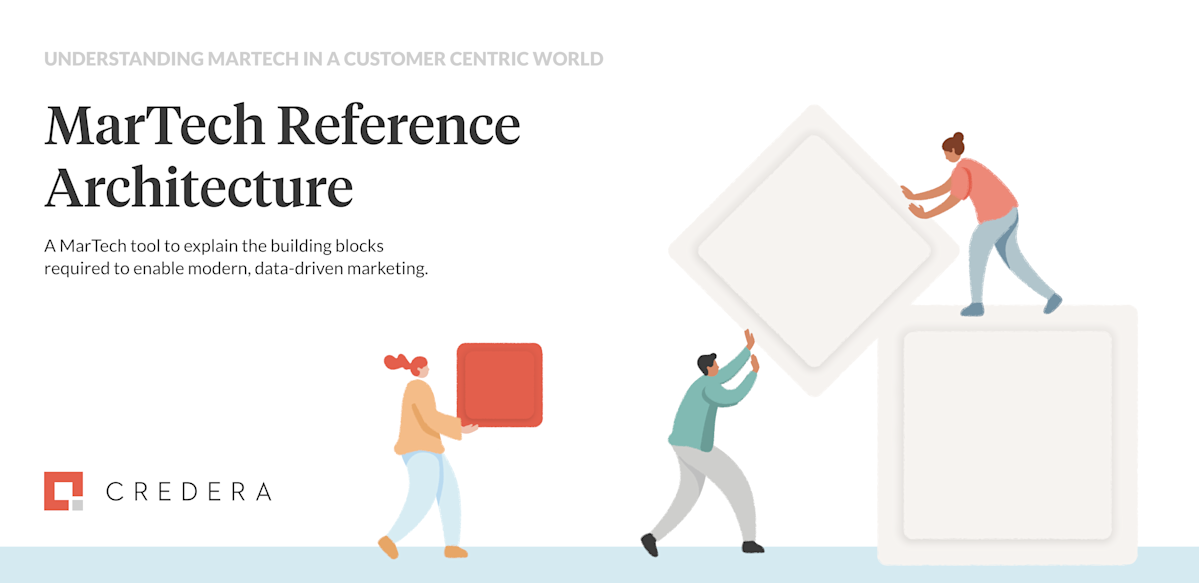Transformation
Sep 06, 2024
Credera’s MarTech Reference Architecture part 5: Marketing automation and campaign management

In previous installments of this series it has become clear that organized, consistent first- and third-party data ingestion, processing, and storage make up the unseen foundation behind an effective MarTech architecture. In this installment, we begin to understand how to implement marketing automation and campaign management to activate customers.

What are marketing automation and campaign management?
Marketing automation is the process of delivering orchestrated messaging by putting customer data to work. It enables brands to tailor customer journeys at scale to deliver personalized and timely content across multiple channels. Effective marketing automation practices can increase the customer connection with brands over time via consistent and relevant messaging tailored to the needs of the individual.
Campaign management is the process of determining how and what to automate, then monitoring and making adjustments based on performance over time. Marketing automation is not a “set it and forget it” solution to customer communication. A campaign or customer journey is only as good as the key performance indicators (KPIs) determined prior to launch. Analyzing and modifying an in-progress campaign are vital components to the success of a technology-driven marketing strategy.
Why marketing automation and campaign management matter
The average consumer has more choices than ever when deciding where to take their business. In the age of COVID-19, customers have especially high expectations for their digital interactions with brands. Companies must devote increased effort to providing exceptional customer experiences, even when customers never set foot in a brick-and-mortar location.
According to Salesforce Research’s 2019 State of the Connected Customer report, 62% of customers expect companies to adapt based on their actions and behavior. Effective marketing automation practices meet this challenge via rigorous customer data analysis, identification of customer behavior patterns, and proactive implementation of personalized marketing journeys that address the specific needs of these archetypal customers. Marketing automation is key to delivering an optimal customer experience and works best in collaboration with other MarTech tools such as ecommerce and CMS, where consistent messaging can be delivered to the customer when they need it. Ultimately, continuous positive interactions with a brand can lead to an increased brand loyalty and conversion rate.
In addition to enabling businesses to keep up with customer expectations, organizations with a mature marketing automation strategy can easily adapt to changing market needs. This has been made increasingly apparent in a post-COVID-19 world, where these businesses were able to move quickly to provide timely and relevant information to their customers, continuing to foster the customer relationship and win trust through uncertain times.
Top marketing automation and campaign management players and technologies
Most major players have both a designated business-to-consumer (B2C) and business-to-business (B2B) offering with similar foundational features. B2C offerings generally provide solutions for multi-channel marketing via email, SMS, and social media, as well as tools for email and simple marketing web page design. B2B offerings aim to bridge sales and marketing teams and tend to provide form capture, lead scoring, and sales automation tools that can nurture and qualify leads for companies with high-touch sales cycles.

How to implement marketing automation and campaign management: Drive maturity
The holy grail of marketing automation is driving one-to-one personalization, as if the message was crafted specifically for an individual. To deliver this type of experience, marketing organizations need to modernize how they communicate with customers and may need to make some internal changes to how they conduct planning and work with other departments. With this in mind, consider these three keys to driving maturity in your marketing automation and campaign management strategies:
1. Forget “batch and blast” email campaigns
The days of building and executing a holiday-based email marketing calendar are long gone. A customer-centric approach to marketing is vital and expected by today’s average consumer. This means understanding and anticipating a customer’s needs and going the extra mile to earn their trust and loyalty before, during, and after the point of sale. Remember that this transition isn’t just about new content for journeys, but also about evolving your marketing data to facilitate real-time, personalized experiences for customers.
2. Accept the technical evolution of marketing strategy
While the welcoming user interfaces of many marketing automation programs make it look deceptively simple, the creation of customer journeys and personalized content is complex and requires considerable pre-work, planning, and inter-functional collaboration. Implementing an advanced marketing campaign or customer journey may require:
Collaborating with IT and other internal teams to align processes, roadmaps, and secure any resources needed to support the needs of the project.
Cleansing, consolidating, and ingesting customer data from external systems into your marketing automation platform.
Segmenting customer data via advanced database query languages.
Designing and building compelling email content that remains consistent across email clients.
Logically constructing the flow of customers through a marketing journey.
Integrating your marketing platform with external systems to capture sales leads and other relevant customer data.
In addition to the above, investing in dedicated technical specialists and marketing analytics roles for your marketing team may prove vital to getting the most out of your platform of choice.
3. Determine KPIs and measure campaign success accordingly
Identifying relevant campaign KPIs is an indispensable part of the planning process for every marketing automation campaign. Well-defined KPIs help determine the effectiveness of campaigns by tracking customer engagement, conversion, retention, and the overall return on investment for your marketing automation programs. Not only do these metrics help identify what works and course-correct when things do not go as planned, they also empower you to make data-driven decisions about where to invest your next digital marketing dollar.
Current trends and considerations
1. AI-based marketing automation
From Salesforce Einstein to Adobe Sensei, major players in the marketing automation platform space are weaving artificial intelligence (AI) optimization into the fabric of their toolsets to allow for intelligent campaign optimizations. Subscriber lists can be automatically scored and classified into personas based on engagement with marketing campaigns, and predictive analysis can deliver next-best-action product recommendations. Additionally, these tools can assist in determining the optimal time to reach a subscriber based on the specific behaviors of the individual.
2. Mobile-first marketing
Online interactions via mobile device have become so ubiquitous that Google is planning to have indexed the entire web via a mobile-first approach by September 2020. If your brand website’s relevance is evaluated based on the content present on its mobile version, it is time to start doing the same for your marketing communication. Whether you reach your customer via email, SMS, or push notification, every aspect of your design and messaging must be tailored to the needs of a mobile user while still being approachable via more traditional devices.
Up next: Data Management platforms and advertising technology
In our next installment of the MarTech Reference Architecture overview, we will talk about the importance data management platforms (DMPs) and advertising technology. As a quick preview, DMPs collect and organize data from a wide range of sources to allow for intelligent audience segmentation and extension.
Overview of articles in the series:
Part 5: Marketing Automation & Orchestration
Reach out to one of our customer data and MarTech experts for more information on how the MarTech Reference Architecture can be used to assess your MarTech ecosystem, map out a strategy for driving better customer experiences and marketing outcomes, and mature your consent management and data privacy practices.
Contact Us
Ready to achieve your vision? We're here to help.
We'd love to start a conversation. Fill out the form and we'll connect you with the right person.
Searching for a new career?
View job openings





